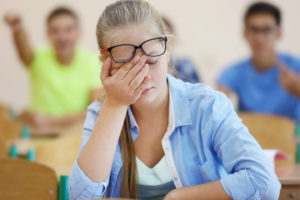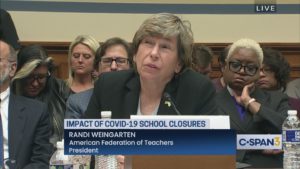WSU professor details COVID school closures impact on students, parents
(The Center Square) – Benjamin Cowan, associate professor at Washington State University’s School of Economic Sciences, delved into the impact COVID-19 school closures have had on children and…

(The Center Square) – Benjamin Cowan, associate professor at Washington State University’s School of Economic Sciences, delved into the impact COVID-19 school closures have had on children and parents during the Washington Academy of Sciences’ annual symposium, which was held virtually on Wednesday.
He was quick to address the elephant in the room: Monday’s release of the latest National Assessment of Education Progress exams that found a record drop in learning across the U.S. since the last test in 2019.
“And you can see that between 2020 and 2022, we’ve fallen off in a way that’s kind of erased – at least for now – the gains that we’ve seen over the past couple of decades,” he said.
Mirroring results across the country, Washington fourth-graders saw a 5 point decline in math, while eighth-graders saw a decline of 10 points. In reading, Washington fourth-graders saw a 3-point drop, and eighth-graders saw a 5-point drop.
Nationwide, fourth grade math scores dropped by 5 points, and eighth grade math scores sank by 8 points. In both grades, math scores fell by the largest amount on record. In reading, scores fell by 3 points for both fourth- and eighth-graders.
Cowan speculated that learning loss may have occurred even if schools had remained open during the pandemic due to increased absences of students and teachers, as well as increased levels of stress and anxiety.
“Nevertheless, policy decisions about schooling mode were likely one of the big drivers in terms of impacting students and their families,” he conceded.
He provided some context by pointing to a study by the Washington, D.C.-based Brookings Institution released in January that found math score drops are significantly larger than estimated impacts from other large-scale school disruptions.
Average fall 2021 math test scores in grades 3 through 8 were 0.20-0.27 standard deviations lower relative to same-grade peers in fall 2019, according to the study, while math scores dropped 0.17 standard deviations lower in one year for New Orleans evacuees who had to leave the city because of Hurricane Katrina.
Standard deviation is the average distance between all test scores and the average score.
“So this is big,” Cowan said. “These are large declines.”
The Brookings study looked at ways to mitigate the learning losses due to a lack of in-classroom time during the pandemic.
Reducing classroom size had little effect on test scores, Cowan explained, while summer programs were only slightly more successful.
Tutoring, according to the study, is the way to go.
“The gold standard here is tutoring, which has been shown in many studies to improve student test scores,” Cowan said.
But there is a catch.
“The difficulty, of course, is that tutoring is by far the most expensive way to do this,” he said, noting that scaling up tutoring is prohibitively costly.
School closures also impacted parents and their jobs, Cowan said, referencing a study he co-authored with Kairon Garcia, “The Impact of U.S. School Closures on Labor Market Outcomes During the COVID-19 Pandemic,” originally put out in January and revised this month.
“Nevertheless, both men and women experienced a decline in whether they are full time workers – that is 35 hours a week or more – and in the number of work hours itself,” Cowan said.
The negative effects of the pandemic on work seemed to be blunted for those with a college degree, per the study.
“If you look at women in particular, you see there are larger effects – and in some cases, substantially larger effects – for women with no college degree versus women with a college degree,” Cowan said. “The same is largely true for men.”
Put simply, those with a college degree were more apt to be able to work from home.
“Those with a college degree or more often are in occupations that have high telework potential,” Cowan said.
That translated into a lesser impact in terms of employment, including being at home along with their school-aged children.
“It’s not as if their lives weren’t disrupted, but at least in terms of whether they worked and how much they worked, there were much smaller if any effects than there were for those whose occupations didn’t have that potential, which would certainly be correlated with not having a college degree,” Cowan said.
In short, the closure of schools because of COVID had a detrimental impact on both students and parents.
“The broad messages, I think, are that school closures did contribute significantly to declines in test scores that we’ve seen,” Cowan said.
It’s the same with working moms and dads.
“School closures also contributed to significant reductions in parental work and earnings,” Cowan said.



